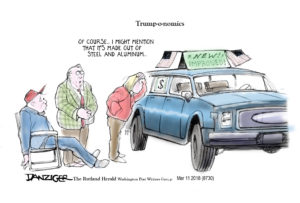Gas-Fueled Cars Will Soon Be a Thing of the Past
Oil-based fuel already costs three times more than cheap renewables, spelling the end of gas- and diesel-powered vehicles. On the road to nowhere: Petrol and diesel fuel cannot survive much longer. Mahkeo / Unsplash
On the road to nowhere: Petrol and diesel fuel cannot survive much longer. Mahkeo / Unsplash
The days of oil as a fuel for cars, whether petrol or diesel, are numbered − because the economies offered by wind and solar energy and other cheap renewables, combined with electric vehicles, are irresistible, a French bank says.
BNP Paribas Asset Management calculates that oil majors like Exxon, BP and Shell will have to produce petrol from oil at $10 a barrel (the current price is $58) to compete with electricity on price, while for diesel, it says, oil can cost no more than $19 a barrel.
“The oil industry has never before in its history faced the kind of threat that renewable electricity in tandem with electric vehicles poses to its business model,” the bank says. Electric vehicles (EVs) could easily replace 40% of the current market for crude oil.
The far lower cost of driving electric vehicles, plus the environmental benefits of cleaner air and the reduction in carbon emissions, will make it overwhelmingly attractive to governments to switch from fossil fuels to renewables for powering the world’s light vehicles.
“The economics of oil for gasoline and diesel vehicles versus wind- and solar-powered EVs are now in relentless and irreversible decline”
Warnings that Big Oil’s position is precarious have been sounding for several years. Some see the global industry reaching its peak within the next decade. In several countries car plants are being converted to all-electric production, a move perhaps prompted by a wish to regain market share after a less than happy episode in consumer relations.
But the bank’s report for professional investors, Wells, Wires, and Wheels, will certainly make bleak reading for the oil industry. Its conclusions are based on the bank’s calculations of how much it costs to get energy to the car wheels.
Its analysis concludes that “after adjusting for all of the costs and all of the energy losses of delivering oil from the well to the wheels on the one hand, and renewable electricity to the wheels of EVs on the other, new wind and solar projects combined with EVs would deliver 6.2 to 7 times more useful energy than petrol”.
This is with oil at its current market price of $60 a barrel. Renewables would also provide 3.2 to 3.6 times more power than diesel for the same cost.
Rising efficiency
The report says: “Moreover, this is on the basis of the costs and efficiency rates of the renewable electricity technologies as they exist today. Yet, over time, the costs of renewables will only continue to fall, while their efficiency rates will continue to rise.”
The report concedes that at the moment the oil industry has huge advantages of scale, because it is already servicing the world’s vehicle fleet. To take its business away, renewables have to scale up and provide the quantity of electricity and the number of charging points required for a mass electric vehicle market.
It argues, however, that oil has a major disadvantage. For every dollar spent at the pump on petrol, nearly half that cost has already gone on refining the oil, transporting it to the pump, marketing and tax. Electricity on the other hand is delivered to cars along wires at only a tiny fraction of the cost of oil-based fuels.
The bank concludes that the oil industry also has another huge disadvantage. It has to decide on future investments in new oil fields without knowing in advance the occasional wild fluctuations in oil price.
Declining oil yield
Each year the oil majors have to make such decisions about fields which need to be added to production to replace the 10% annual decline in the yield from old fields, leaving them working 10 years in advance.
By the bank’s calculations, unless the new oil can be brought on stream at $10 a barrel or less, the oil companies will have to sell petrol and diesel at a loss to compete on price with electric cars running on renewables.
Investment decisions made now on the basis of an oil price of $60 a barrel risk creating assets that cannot be sold profitably and would have to be left in the ground.
The report says: “We conclude that the economics of oil for gasoline and diesel vehicles versus wind- and solar-powered EVs are now in relentless and irreversible decline, with far-reaching implications for both policymakers and the oil majors.”
Your support matters…Independent journalism is under threat and overshadowed by heavily funded mainstream media.
You can help level the playing field. Become a member.
Your tax-deductible contribution keeps us digging beneath the headlines to give you thought-provoking, investigative reporting and analysis that unearths what's really happening- without compromise.
Give today to support our courageous, independent journalists.




You need to be a supporter to comment.
There are currently no responses to this article.
Be the first to respond.